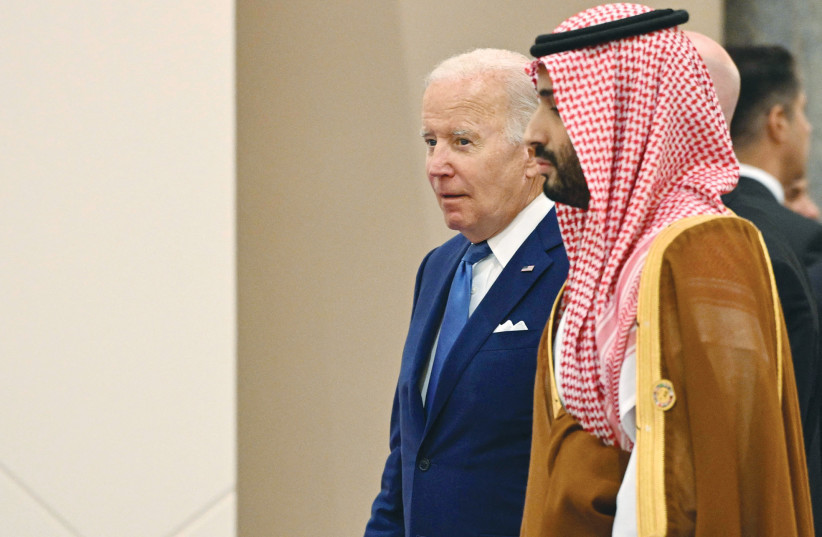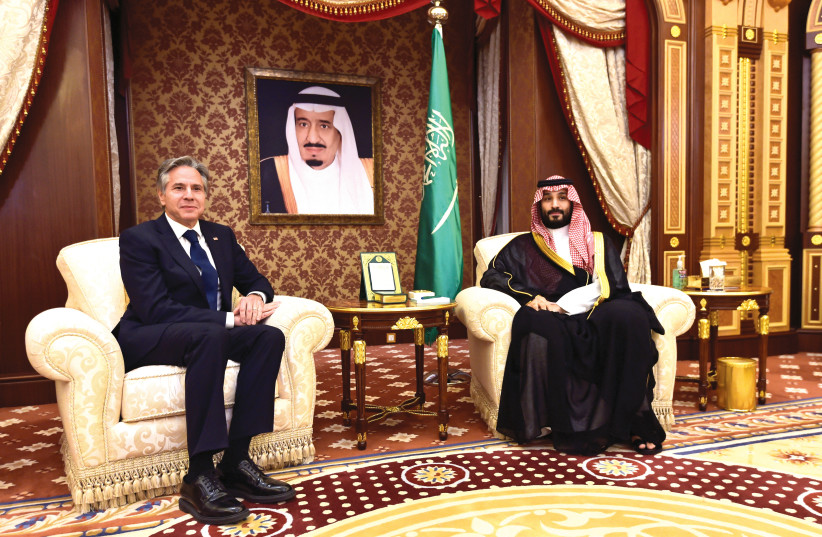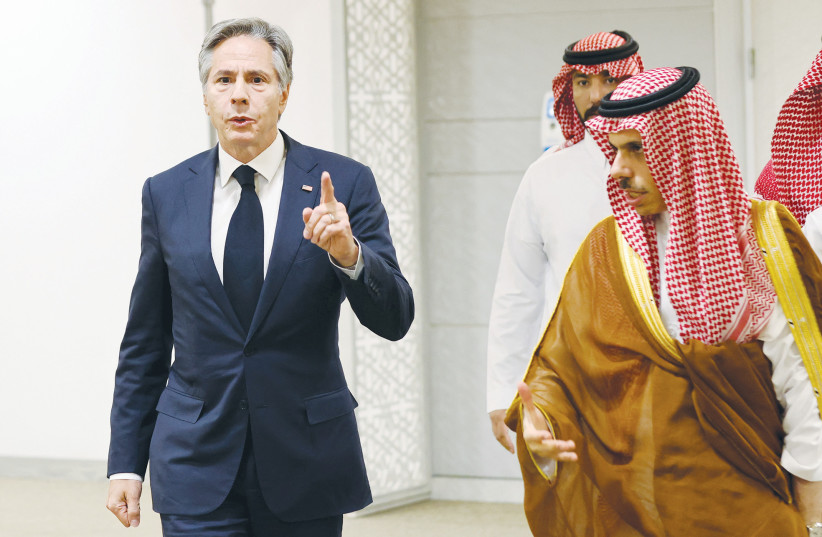“The normalization will be between Israel and Saudi Arabia. If the Palestinians oppose it the kingdom will continue in its path,” according to one regional source.
REUTERS SEPTEMBER 29, 2023 10:54

Saudi Arabia is determined to secure a military pact requiring the United States to defend the kingdom in return for opening ties with Israel and will not hold up a deal even if Israel does not offer major concessions to Palestinians in their bid for statehood, three regional sources familiar with the talks said.
A pact might fall short of the cast-iron, NATO-style defense guarantees the kingdom initially sought when the issue was first discussed between Crown Prince Mohammed bin Salman and Joe Biden during the US president’s visit to Saudi Arabia in July 2022.
Instead, a US source said it could look like treaties Washington has with Asian states or, if that would not win US Congress approval, it could be similar to a US agreement with Bahrain, where the US Navy Fifth Fleet is based. Such an agreement would not need congressional backing.
Washington could also sweeten any deal by designating Saudi Arabia a Major Non-NATO Ally, a status already given to Israel, the US source said.
But all the sources said Saudi Arabia would not settle for less than binding assurances of US protection if it faced attack, such as the Sept. 14, 2019 missile strikes on its oil sites that rattled world markets. Riyadh and Washington blamed Iran, the kingdom’s regional rival, although Tehran denied having a role.

Saudi Arabia’s Crown Prince Mohammed bin Salman meets with US Secretary of State Antony Blinken in Jeddah, earlier this month. (credit: AMER HILABI/REUTERS)
Agreements giving the world’s biggest oil exporter US protection in return for normalization with Israel would reshape the Middle East by bringing together two longtime foes and binding Riyadh to Washington after China’s inroads in the region. For Biden, it would be a diplomatic victory to vaunt before the 2024 US election.
The Palestinians could get some Israeli restrictions eased but such moves would fall short of their aspirations for a state. As with other Arab-Israeli deals forged over the decades, the Palestinian core demand for statehood would take a back seat, the three regional sources familiar with the talks said.
Saudis will normalize relations with Israel, even without the Palestinians
“The normalization will be between Israel and Saudi Arabia. If the Palestinians oppose it the kingdom will continue in its path,” said one of the regional sources. “Saudi Arabia supports a peace plan for the Palestinians, but this time it wanted something for Saudi Arabia, not just for the Palestinians.”
The Saudi government and the US State Department did not respond to emailed questions about this article.
‘Less than a full treaty’
A US official, who like others declined to be named because of the sensitivity of the matter, said the parameters of a defense pact were still being worked out, adding that what was being discussed “would not be a treaty alliance or anything like that … It would be a mutual defense understanding, less than a full treaty.”
The official said it would be more like the US relationship with Israel, which receives the most advanced US weapons and holds joint air force and missile defense drills.
A source in Washington familiar with the discussions said MbS had asked for a NATO-style treaty but said Washington was reluctant to go as far as NATO’s Article 5 commitment that an attack on one ally is considered an attack on all.
The source said Biden’s aides could consider a pact patterned on those with Japan and other Asian allies, under which the US pledges military support but is less explicit about whether US troops would be deployed. However, the source said some US lawmakers might resist such a pact.
Another template, which would not need congressional approval, would be the agreement signed with Bahrain on Sept. 13, in which the US pledged to “deter and confront any external aggression” but also said the two governments would consult to determine what, if any, action would be taken.

The source in Washington said Saudi Arabia could be designated a Major Non-NATO Ally, a step which had long been considered. This status, which several Arab states such as Egypt have, comes with a range of benefits, such as training.
The second of the regional sources said Riyadh was compromising in some demands to help secure a deal, including over its plans for civilian nuclear technology. The source said Saudi Arabia was ready to sign Section 123 of the US Atomic Energy Act, establishing a framework for US peaceful nuclear cooperation, a move Riyadh previously refused to take.
The Gulf source said the kingdom was prepared to accept a pact that did not match a NATO Article 5 guarantee but said the US had to commit to protecting Saudi Arabia if its territory was attacked. The source also said a deal could be similar to Bahrain’s agreement but with extra commitments.
Seeking Israeli commitments
Israel’s Prime Minister Benjamin Netanyahu has hailed the possibility of a “historic” peace with Saudi Arabia, the heartland of Islam. But to secure the prize, Netanyahu has to win the approval of parties in his a far-right coalition which reject any concessions to the Palestinians.
MbS said in a Fox News interview this month that the kingdom was moving steadily closer to normalizing ties with Israel. He spoke about the need for Israel to “ease the life of the Palestinians” but made no mention of Palestinian statehood.
Nevertheless, diplomats and the regional sources said MbS was insisting on some commitments from Israel to show he was not abandoning the Palestinians and that he was seeking to keep the door open to a two-state solution.
Those would include demanding Israel transfer some Israeli-controlled territory in the West Bank to the Palestinian Authority (PA), limit Jewish settlement activity and halt any steps to annex parts of the West Bank. Riyadh has also promised financial aid to the PA, the diplomats and sources said.
Palestinian President Mahmoud Abbas has said any bargain must recognize the Palestinian right to a state within the 1967 borders, including East Jerusalem, and must stop Israeli settlement building. However, all the sources said a Saudi-Israeli deal was unlikely to address those flashpoint issues.
Netanyahu has said Palestinians should not have a veto over any peacemaking deal.
Yet, even if the US, Israel, and Saudi Arabia agree, winning support from lawmakers in the US Congress remains a challenge.
Republicans and those in Biden’s Democratic Party have previously denounced Riyadh for its military intervention in Yemen, its moves to prop up oil prices, and its role in the 2018 killing of Saudi journalist Jamal Khashoggi, who worked for the Washington Post. MbS denied ordering the killing.
“What’s important for Saudi Arabia is for Biden to have the pact approved by Congress,” the first regional source said, pointing to concessions Riyadh was making to secure a deal.
For Biden, a deal that builds a US-Israeli-Saudi axis could put a brake on China’s diplomatic inroads after Beijing brokered a rapprochement between Saudi Arabia and Iran, which Washington accuses of seeking nuclear arms. Tehran denies this.
“There was a sense that the US has abandoned the region,” said one diplomat. “By courting China, the Saudis wanted to create some anxiety that will make the US re-engage. It has worked.”
Content retrieved from: https://www.jpost.com/israel-news/article-760980.